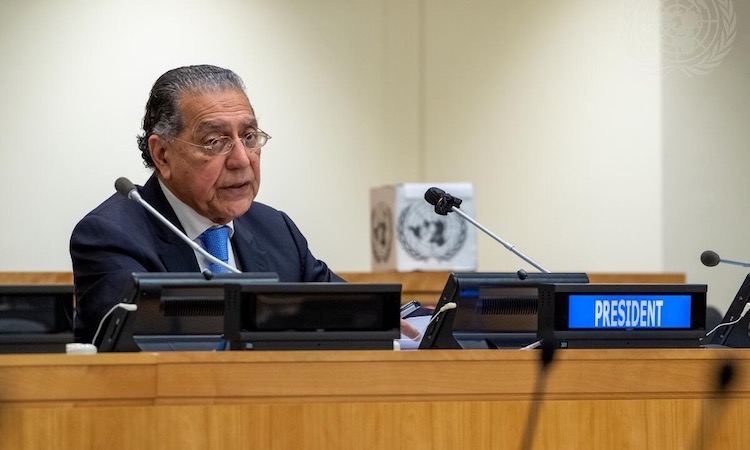By Razeena Raheem
UNITED NATIONS (IDN) — The Group of 77 and China, the largest single coalition of developing nations, hosted an Ambassadorial-level briefing on carbon capture technology at the United Nations. The briefing, which took place August 1, was titled “Carbon Capture Utilization & Storage—Technology Essential for an Equitable Energy Path Forward.”
Addressing the meeting, Ambassador Munir Akram of Pakistan, chairman of the G77, said: “I think our goals as the Group of 77 and China are clear.”
“We are committed to equitable economic growth in the world, and especially to promote growth in our countries. And we are also committed to addressing the climate crisis. Although we were not responsible for this, we have assumed the commitment to participate in addressing this climate.”
“We would, I think, need to utilize all possible paths to these two objectives of growth and sustainability of growth. And in that, of course, renewable energy is an important option and will contribute a part of the solution as would nuclear and hydro and other alternative sources of energy,” he declared.
“But, as we … have all come to realize, especially in recent months, fossil fuels remain a reality. And that we will need to find ways of how we can exploit the rich natural resources that so many of our countries possess.”
In fossil fuels, whether it’s oil, gas or coal, Ambassador Akram pointed out, “we will need to find ways to utilize this without contributing to the climate crisis, and in that context, the technology which we’ve discussed today, the carbon capture and use technology is an option, as there are other technologies which are also evolving in the field of containing carbon emissions.”
“But without carbon capture, as has been said here, we will not be able to reach the target of net zero. And I think that is a reality that we should face because that is what the numbers show us. So, we need to incentivize carbon capture technologies. And to have investment directed in developing countries to be able to use CCUS and other similar technologies in order to exploit their resources in a climate friendly way,” he advised.
“I think as developing countries we need to learn more, and some of our participants here the distinguished ambassadors of Qatar and Saudi Arabia, have mentioned some of the projects that are already underway on carbon capture in developing countries and we should learn from that experience. We should learn from the experience of the developed countries, including the United States,” he added.
The list of speakers included the Permanent Representatives of Qatar, Tajikistan, Saudi Arabia and the Deputy Permanent Representatives of South Africa and Indonesia, along with diplomats from Egypt, China, Senegal, Nigeria and Iraq.
The panelists included Irfan K. Ali, Managing Partner and CEO, Balico; Charles McConnell, University of Houston Energy Center Officer, Assistant Secretary, Fossil Energy, U.S. Department of Energy (2011-13), CCUS & Carbon Management; Nigel Jenvey, New Frontiers Managing Partner at Baker Hughes and Carbon Management Special Advisor at Gaffney Cline, and Michael J. Nasi, JD and Partner at Jackson Walker.
There were two short videos that were shown at the briefing. The links follow: Poverty is Energy Poverty:https://www.youtube.com/watch?v=nEovKjVkUpc&t=1s
Carbon capture: How it works?:https://www.youtube.com/watch?v=TIXVvAoQBjc&t=1s
The briefing was streamed live by UN Web TV and is available on demand: https://media.un.org/en/asset/k1w/k1w7wz6hqu [IDN-InDepthNews – 08 August 2022]
Photo: Ambassador Munir Akram of Pakistan, chairman of the Group of 77 and China.
IDN is the flagship agency of the Non-profit International Press Syndicate.
This article is published under the Creative Commons Attribution 4.0 International licence. You are free to share, remix, tweak and build upon it non-commercially. Please give due credit.

